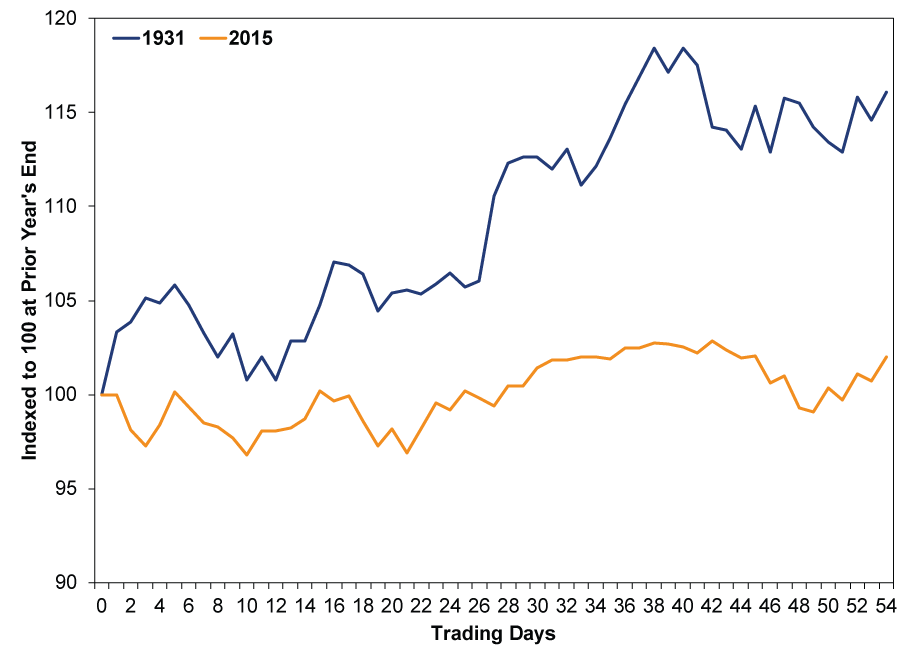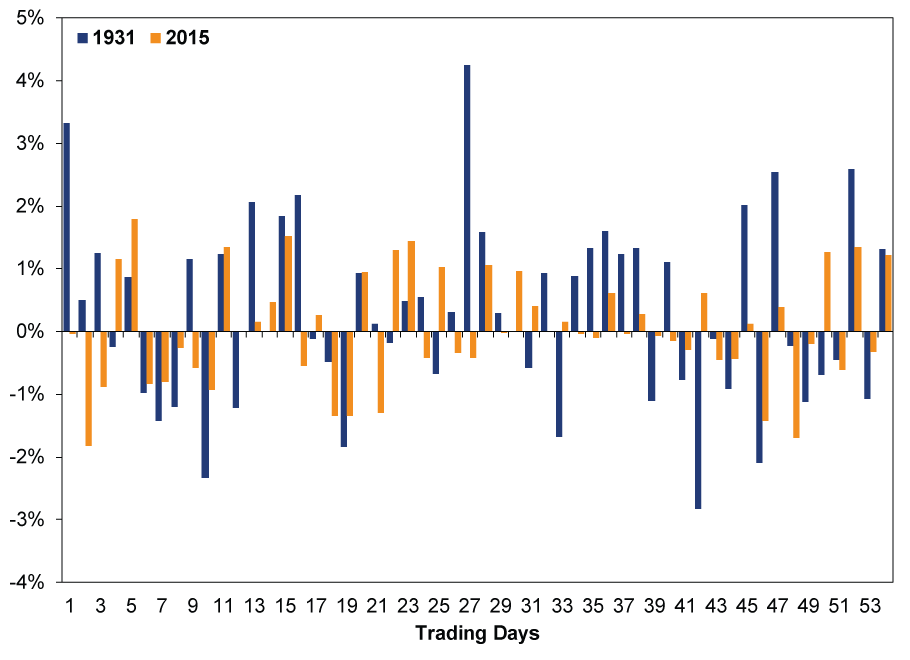Personal Wealth Management / Market Analysis
Friday Treat: Why 2015 Won’t Repeat the S&P 500’s Worst Year Ever
Why one freaky statistic shouldn't scare you.
According to one investment research group, of all the years on record, 2015's stock returns look most like 1931-the S&P 500's worst year ever, and there are two things you need to know about this. One, this predicts nothing, and two, 2015 does not resemble 1931.
To make the comparison, the researchers compared the S&P 500 price index's year-to-date return through March 18 with equivalent periods at the beginning of every year on record, then ranked them according to their correlation coefficient. That is statspeak for how closely one year's directionality resembles another. 1931's first 54 trading days had the highest correlation, 0.8%-very close to 1, which would represent perfect correlation. The next closest was 1945 at 0.76, then 1996 at 0.7.
This is a fun study, because history and patterns are fun! But fun is all it is. Around the MarketMinder braintrust, we have a slogan: "No correlation without causation!" But even if you don't buy that and instead believe patterns are predictable, there actually isn't much of a pattern here. Yes, there is mathematical correlation! But here is what that supposedly strong relationship actually looks like.
Exhibit 1: Cumulative Return Over First 54 Trading Days, 1931 & 2015
Source: FactSet, as of 3/20/2015. S&P 500 Price Index, 12/31/1930 - 3/18/1931 and 12/31/2015 - 3/18/2015.
Do they move in the same direction a lot? Yah! But the magnitude is way off. This far into 1931, the S&P 500 was up 16.1% for the year. As of 3/18/2015, it was up 1.9%.
Here's the thing about statistics: They are malleable. For example, I can beat these data with a single Excel formula and get a much weaker relationship. Like this:
Exhibit 2: Daily Percentage Return Over First 54 Trading Days, 1931 & 2015
Source: FactSet, as of 3/20/2015. S&P 500 Price Index, 12/31/1930 - 3/18/1931 and 12/31/2015 - 3/18/2015.
See all that noise? It's loud! And the correlation coefficient is 0.27. That is very weak-it implies next to no relationship.
Exhibit 2 isn't the only way in which this year looks nothing like 1931. As the intrepid researchers point out, events today bear no resemblance. In 1931, America was in the throes of the Great Depression, still clinging to a gold standard that caused money supply and velocity to plummet. Monetary policy was going haywire. Prices and incomes tumbled. Banks failed left and right. Central Park was basically a homeless encampment. Breadlines and food riots were the norm. I hope you will not think me a dismissive meanie if I simply say, there is nothing going on today to suggest we're in for a repeat in the immediate future. Which means there is little to no reason for stocks to fall 54% over the rest of the year, as they did after March 18, 1931.
Look, none of this is to poke these researchers, whose report I'm not entirely convinced wasn't intended as humor (other insights included: years ending in 5 have always been positive). It's more to point out two simple, often overlooked truths about investing: Patterns are easy to mine, and they don't predict the future.
Beat the Crowd, by Ken Fisher with Elisabeth Dellinger, is available for pre-order now. Order your copy today!
If you would like to contact the editors responsible for this article, please message MarketMinder directly.
*The content contained in this article represents only the opinions and viewpoints of the Fisher Investments editorial staff.
Get a weekly roundup of our market insights
Sign up for our weekly e-mail newsletter.

You Imagine Your Future. We Help You Get There.
Are you ready to start your journey to a better financial future?

Where Might the Market Go Next?
Confidently tackle the market’s ups and downs with independent research and analysis that tells you where we think stocks are headed—and why.







